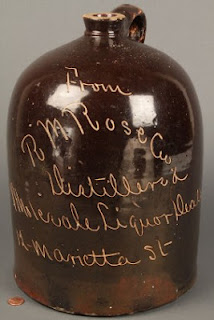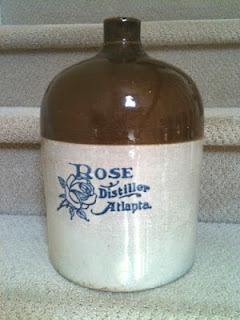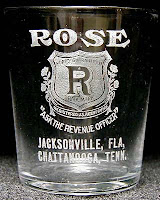 When the definitive history of American distilling is written, Rufus Mathewson Rose -- whose company gave rise to the familiar “Four Roses” brand whiskey -- will deserve considerable attention. Not the least of his accomplishments were his early use of aggressive advertising and the range of stoneware jugs in which he marketed his products.
When the definitive history of American distilling is written, Rufus Mathewson Rose -- whose company gave rise to the familiar “Four Roses” brand whiskey -- will deserve considerable attention. Not the least of his accomplishments were his early use of aggressive advertising and the range of stoneware jugs in which he marketed his products.Rufus Rose, shown here in maturity, was born in 1836, a Connecticut Yankee with a Puritan pedigree. While studying medicine in New York, he traveled in 1853 to Hawkinsville, Georgia, to help out temporarily in his uncle’s drugstore. He liked the place and the work. In 1858 he moved to Dixie for good and in 1860 opened his own drugstore in Hawkinsville. That same year he married a local girl, Susan Wilcox of Wilcox County.
Sympathetic to the Southern cause in the Civil War, Rose closed his business early in the conflict and despite his medical background enlisted as a foot soldier. In late 1861 he was reassigned by the Confederacy to be a pharmacist and sent to work in Virginia. There his health failed and he was honorably discharged in 1862.
He then relocated to Macon, Ga., where he opened a laboratory to produce medicines for the Southern cause. Rose’s health eventually was restored, the enterprise proved successful, and he was honored by being named a captain in the Georgia reserves by the Governor. In 1864 his first wife, Susan, died. The next year he married again, to Katherine Fleming of Pulaski County, Ga. They eventually had two children, Randolph and Laura.
After the Civil War, Rose relocated to Atlanta where about 1867 he organized a whiskey producing enterprise he called “House of Rose.” His knowledge of the chemistry of distilling and business acumen were rewarded with rapid success. He built a large distillery on Stillhouse Road in nearby Vinings and established a retail store for selling whiskey in the downtown Atlanta.
According to one contemporary account, this transplanted Yankee became “very successful, winning a prominent place among Atlanta’s enterprising citizens.” By 1870 as “R.M. Rose Co. Distillers,” Rufus was advertising his products heavily in the Atlanta and other Southern newspapers, touting such blended rye and corn liquor products as “Rose’s Atlanta Spirit Rye,” “Rose’s Mountain Dew, “ “Blue Ridge Whiskey,” “New Sweet Mash,” “Old Reserve Stock” and “Special Old Corn.”
Rose loved being a distiller and had little time for the anti-liquor folks who proclaimed whiskey “the demon’s drink.” He advertised his whiskeys as “...the purest, safest drink you could buy” and claimed that “when used in moderation, its effect on the human system is wholesome and beneficial....”


Rose was a prime customer of many Georgia potters of his time. Howell’s Mills, a pottery center close to Vinings, produced a wide variety of articles for the distillery, large jugs for providing whiskey wholesale to taverns and saloons and smaller containers for direct sales to the public. These stoneware jugs described a broad range of appearance, from beehive shapes and “scratch” jugs to shoulder jugs with overglaze labels. Some had the traditional brown top and beige body, others were covered entirely with brown Albany slip or white Bristol glaze.
Sometime after 1900 Rose moved to fancier jugs with an underglaze transfer that says “Rose Distiller” and the drawing of a single large rose. Variations on this jug are those most frequently depicted in books and magazines but all Rose ceramics currently are collected, particularly on a regional basis.


Despite whiskey distilling being a major Southern industry, states below the Mason-Dixon line were prominent among those experimenting with prohibition laws. When Atlanta briefly went “dry” in 1885 Rose moved his offices from his beloved city for two years until it legalized liquor again. During this period Rose also opened an operation in Jacksonville, Florida.
 His confidence in being able to continue operations seems expressed in his building a mansion in 1901 for $9,000 on Peachtree Street, then the neighborhood of Atlanta’s elite. Following the fashion of the time, the architecture of the home is Queen Anne-style but it was placed on a narrow lot that gave it a townhouse look. Nonetheless, the Rose mansion was included in the 1903 “Art Works of Atlanta.” The house still stands today and recently was up for sale.
His confidence in being able to continue operations seems expressed in his building a mansion in 1901 for $9,000 on Peachtree Street, then the neighborhood of Atlanta’s elite. Following the fashion of the time, the architecture of the home is Queen Anne-style but it was placed on a narrow lot that gave it a townhouse look. Nonetheless, the Rose mansion was included in the 1903 “Art Works of Atlanta.” The house still stands today and recently was up for sale.After only a few years in his fancy new home, Rose must have been devastated when the State Legislature voted all of Georgia dry in 1907. He shut down the distillery in Vinings and the Atlanta retail outlet. Then R.M. Rose Distillers moved lock, stock and barrels to Chattanooga, Tennessee. A shot glass from that period marks the move.

Rufus, however, was devoted to Atlanta and refused to go. Resigning as president, he turned over the business to son Randolph and devoted his time to his thriving Atlanta real estate interests. Rufus died at his home on Peachtree Street in 1910 at the age of 74.
His funeral, held at his home, was a major event. An Atlanta newspaper reported: “The funeral was one of the largest in point of attendance ever held in Atlanta for a private citizen, the entire first floor of the large resident and the front lawn proving altogether inadequate to accommodate the hosts of friends who gathered to pay the last sad tributes to one who has played an important part in the upbuilding of Atlanta, even though he at all times refused absolutely to permit his name to be used for any public office.” His grave was marked with a sign of his service in the Confederate Army.
A late achievement may also have been Rose’s most lasting. About 1906, according to accounts, he came up with the special blend that he called “Four Roses.” But it was only after Rose Distillery was transplanted to Chattanooga that the name became a synonym for American whiskey throughout the U.S. and eventually the world. By 1914 Four Roses was a national best-selling bourbon.
Almost from the beginning the origin of the Four Roses name has been in dispute. One ad claimed Rufus named the whiskey after his four daughters; but he had only one. Family members believe the four Roses were Rufus himself, son Randolph, brother Origen, and Origen’s son. Another story ties the name to Rose at one time having run four retail establishments. But other records fail to document that number of retail outlets.
Whatever the origins of its most famous brand, the Rose Distillery, relocated in Chattanooga, had little time left. In 1910 Tennessee enacted statewide liquor prohibition. Possibly in frustration, Randolph Rose sold the Four Roses brand name to a whiskey entrepreneur named Paul Jones. Jones moved to Frankfort in still “wet” Kentucky, founded his own distillery, and there built a strong national reputation for the Four Roses name. Eventually the Four Roses brand was purchased by the Seagram Company of Canada which continued to market the bourbon but mainly for export.
Meanwhile, Rufus Rose probably lies happy in the grave knowing that his family name became synonymous with good American whiskey and has been perpetuated around the world.



I have an old jug similar to these bearing the R.M. Rose Co. Mark. Would you be able to give me an approximate age?
ReplyDeleteTheresa: It would be pre-Prohibition, that is, before 1920. Jack
DeleteI purchased a #2 old jug at the flea market it is the Brown top, normal crock color on bottom. it is identical to the "ROSE Distiller Alanta" pictured above, My crock Jug reads "ROSE Distiller Chattanooga", I bought it for $30 and I love it, I had wanted to know its value and history. Please contact me : jewelneeley@yahoo.com
ReplyDeleteThank you,
Jewel Neeley
Dear Ms. Neeley: Your jug is pre-Prohibition and worth somewhat more than $30. Glad you are enjoying it. Jack
DeleteRecently purchased an old wall thermometer with the rose logo on top and R.M. Rose Company Distillers. Underneath the thermometer is says: "The largest and best mail order house in the united states. Just ask the revenue officer". It also lists three locations: Chattanooga, Jacksonville, and New York. Does anyone have history o the New York connection?
ReplyDeleteBill: Your thermometer dates from after the point that Rufus Rose turned over the business to his son, Randolph, when Georgia voted in Prohibition.
ReplyDeleteRandolph moved the offices to Chattanooga, which also went dry several years later, which allows you to date the thermometer. Definitely pre-National Prohibition. As for a New York office, many distillers had a room in NYC office building to conduct sales, often for only a short time because rents were expensive and if sales were not up to expectation the office soon would be closed. I have no dates for a NYC office for Rose. Hope this is helpful. Jack
That's very helpful. I am on temporary assignment to Atlanta and living on Stillhouse Rd. We walk our dog on the old property most days. Still very heavily wooded and, for the most part, undeveloped. The history has been fun to trace and enhances the taste of the drink! Thanks much!
DeleteI have a canty from four roses with the roses on the canty. I was told it was
ReplyDeleteuse for pouring whiskey, and serving it.It has the label four roses distiller co N.Y.C. on it. Can anyone give me the history on this item and value if any.My name is Louise thank you.
Hi Jack,
ReplyDeleteI'm a producer for a radio station in Atlanta (the local NPR affiliate, WABE 90.1) and I'm working on a story about Rufus Rose and his distillery. I'd love to talk with you about him. Let me know how I can reach you, thanks! Best, Stephannie Stokes (sstokes@wabe.org)
i have a 1914 four roses paul jones louisville ky .co seald un opened bottle of liquor can you tell me some imformation and value of it thank you joshwright129@gmail.com
ReplyDeleteDear Josh: Obviously your bottle is more than a century old. Unfortunately as a collectible it will not fetch a whole lot. Bottled as it is, the whiskey should still be good inside and you might want to sample it. It is not legal to send it through the mail with the liquor in it but you might try to sell it at a local flea market full, if you are not into drinking it. If you have some whiskey drinking friends, invite them in to try it with you. This last is what I would do. Best of luck.
ReplyDeleteJack, thank you for your excellent work on the Rose Distillery. It is beautifully done. Last year I bought 7 acres at the end of Stillhouse Road in Vinings, Georgia where Mr. Rose ran his operation for much of his career. I am collecting historical documents related to the distillery as well as jugs, glasses, etc. I would be honored to chat with you. Should you be interested, my email address is huffman.tim@gmail.com
ReplyDeleteDear Tim: Thank you for your kind remarks about my piece on Rufus Rose. It has been a long time since I revisited the Rose story but would be happy to talk to you. Will send my telephone number via your email.
DeleteI have a jug that says Rose Distillery. co
ReplyDeleteThen at the bottom it has P-May. 3 18,18 ???
What do I have?? Thanks.
It also has Roses painted on it!!!
ReplyDeleteJeanette: You have a Rose Distillery jug from Atlanta, which can be loosely dated from about 1880 to 1905. The "P" at the base likely is the mark of the pottery that made it. Rose used many local George potteries to make his jugs. The ones with the roses on them are my favorite but all of them fetch upwards of $50 at auction, assuming they are in good shape. Hope this is helpful. Jack
ReplyDeleteHi Jack, I have some 1916 R.M. Rose CO. mail order forms an pre-prohibition material warning of the coming prohibition to come. These 2 separate mail order pieces have several documents in each, I believe it’s all that was mailed originally in each separate envelope with the post marked date of Feb. 1916 Chattanooga TN with stamps. What would the value of these documents be? One has a poster sized 2 sided product availability and pricing as well. Thank you
ReplyDeleteI have a celluloid( ruler-bookmark-2 year calendar) dated
Delete(1912-1913)with Randolph Rose of Tennessee marked on it.
Never seen one like it. Anybody else seen one?
JBussey: Wish I could be of more help. Your pieces have some value because Rose items are avidly collected, esp. in Georgia, Tennessee etc.
ReplyDeleteI just have not seen anything such as you describe sold recently. You might try eBay and see what response you get.
My name is Brian Gaston and I'm from Cartersville, Ga. I recently found a small metal "badge" medallion with a compass in the middle and some engravings on both sides. It took me a good while to track it's origin to Roses Whiskeys, and would love any feed back that I might get. I am not a collector and would love to see it in it's proper place to educate future generations of a bit of history.
ReplyDeleteBrian: The Rose history is an interesting but complicated one. Rufus was the creative founder but when Georgia went dry, his son moved the operation to Chattanooga. Then when Tenn. went dry, the firm was sold to Paul Jones in Ky. My guess is that since you are in Ga. that yours is the original company and the badge/compass has some worth. As for a "good home" I would contact the Atlanta local history museum and see if they have an interest.
ReplyDeleteFeel free to send along my post to remind them of Rufus.
Very interesting history. I found a 1 gallon Rose Distiller Jacksonville jug but haven't found out much about it. It is the same as your 7th pic in the article but just one gallon and from Jacksonville. Are these more rare since his time in Jacksonville was short? Thanks, Chuck in Chattanooga
ReplyDeleteUnknown: All Rose jugs seem to get good prices. Have no idea if this one would be more valuable. A good find in any case.
ReplyDeleteThank you Jack. I will continue to research it while it looks great on my fireplace hearth. When I got it, I just figured it was some newer jug or a knockoff or something. Your site helped me appreciate it more.
ReplyDeleteHi Jack ~ I’ve enjoyed reading your detailed story of the life of Rufus. I would love to talk with you more about him. I have a personal connection to the family, and several collectible items that I adore.
ReplyDeleteFLMH: Give me a phone number or email address and I will try to be in touch.
ReplyDeleteI am a Rose but not related to R.M. I have several jugs including one from Chattanooga. I also have a metal match case with R.M. Rose Distillers on it and Just ask the Revenuer. The match case was bought at the Rose House by my father. Years ago as a teenager I went through the house with my father. I remember the zero in the back yard.
ReplyDeletePiper of Rose: Thanks for your memory of being in the Rose home. The metal match case was a "good buy." A thriving market exists for Rose=related artifacts.
ReplyDelete